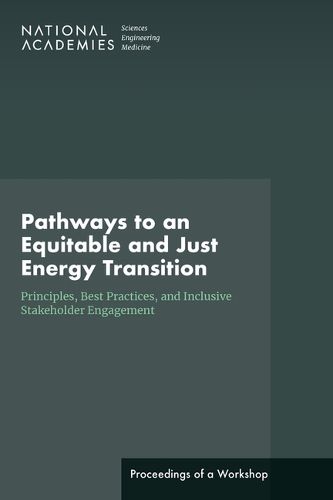Readings Newsletter
Become a Readings Member to make your shopping experience even easier.
Sign in or sign up for free!
You’re not far away from qualifying for FREE standard shipping within Australia
You’ve qualified for FREE standard shipping within Australia
The cart is loading…






While technologies are clearly instrumental in transitioning away from fossil fuel-based energy and toward a decarbonized economy, decisions about which technologies are prioritized, how they are implemented, and the policies that drive these changes will have profound effects on people and communities, with important implications for equity, jobs, environmental and energy justice, health, and more. The National Academies of Sciences, Engineering, and Medicine Committee on Accelerating Decarbonization in the United States: Technology, Policy, and Societal Dimensions was tasked with assessing the broad range of technological, policy, and societal dimensions of decarbonizing the U.S. economy. The committee produced a 2021 report that provides the U.S. government with a roadmap of equitable and robust decarbonization policies. The next report of the committee will address the broader range of policy actors who play a role in equitable energy transition.
To inform its deliberations, the committee hosted a 1-day workshop on July 26, 2022 to discuss critical issues of equity and justice during the energy transition. The goal of the workshop, titled Pathways to an Equitable and Just Transition: Principles, Best Practices, and Inclusive Stakeholder Engagement, was to move beyond energy technologies and elicit ideas and insights to inform the development of principles, best practices, and actionable recommendations for a broad range of policy actors and stakeholders in order to fully operationalize equity, justice, and inclusion. This publication summarizes the presentations and discussion of the workshop.
Table of Contents
Front Matter Overview 1 Public Health, Safety, and Community Resilience 2 Jobs and Workforce Development Opportunities 3 Equitable Access to Transition Technologies, Infrastructure, and Programs 4 Energy Affordability and Burdens 5 Discussion of Pathways for the Energy Transition Appendixes Appendix A: Statement of Task Appendix B: Workshop Agenda
$9.00 standard shipping within Australia
FREE standard shipping within Australia for orders over $100.00
Express & International shipping calculated at checkout
While technologies are clearly instrumental in transitioning away from fossil fuel-based energy and toward a decarbonized economy, decisions about which technologies are prioritized, how they are implemented, and the policies that drive these changes will have profound effects on people and communities, with important implications for equity, jobs, environmental and energy justice, health, and more. The National Academies of Sciences, Engineering, and Medicine Committee on Accelerating Decarbonization in the United States: Technology, Policy, and Societal Dimensions was tasked with assessing the broad range of technological, policy, and societal dimensions of decarbonizing the U.S. economy. The committee produced a 2021 report that provides the U.S. government with a roadmap of equitable and robust decarbonization policies. The next report of the committee will address the broader range of policy actors who play a role in equitable energy transition.
To inform its deliberations, the committee hosted a 1-day workshop on July 26, 2022 to discuss critical issues of equity and justice during the energy transition. The goal of the workshop, titled Pathways to an Equitable and Just Transition: Principles, Best Practices, and Inclusive Stakeholder Engagement, was to move beyond energy technologies and elicit ideas and insights to inform the development of principles, best practices, and actionable recommendations for a broad range of policy actors and stakeholders in order to fully operationalize equity, justice, and inclusion. This publication summarizes the presentations and discussion of the workshop.
Table of Contents
Front Matter Overview 1 Public Health, Safety, and Community Resilience 2 Jobs and Workforce Development Opportunities 3 Equitable Access to Transition Technologies, Infrastructure, and Programs 4 Energy Affordability and Burdens 5 Discussion of Pathways for the Energy Transition Appendixes Appendix A: Statement of Task Appendix B: Workshop Agenda